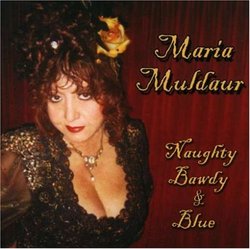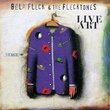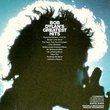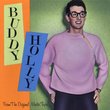| All Artists: Maria Muldaur Title: Naughty Bawdy & Blue Members Wishing: 3 Total Copies: 0 Label: Stony Plain Music Original Release Date: 1/1/2007 Re-Release Date: 5/15/2007 Genres: Blues, Folk, Jazz, Pop Styles: Vocal Blues, Acoustic Blues, Vocal Jazz, Singer-Songwriters, Vocal Pop Number of Discs: 1 SwapaCD Credits: 1 UPC: 772532131926 |
Search - Maria Muldaur :: Naughty Bawdy & Blue
 | Maria Muldaur Naughty Bawdy & Blue Genres: Blues, Folk, Jazz, Pop
Building on her Grammy-nominated collections of classic women's blues from the '20s through the '40s (Richland Woman Blues, 2001, and Sweet Lovin' Ol' Soul, 2005), jazz/blues chanteuse Maria Muldaur returns with Naughty, B... more » |
Larger Image |
CD DetailsSynopsis
Amazon.com Building on her Grammy-nominated collections of classic women's blues from the '20s through the '40s (Richland Woman Blues, 2001, and Sweet Lovin' Ol' Soul, 2005), jazz/blues chanteuse Maria Muldaur returns with Naughty, Bawdy & Blue. It's an apt title for a sassy group of songs originally recorded by Victoria Spivey (one of Muldaur's mentors), Alberta Hunter, Bessie Smith, Ma Rainey, and other female urban blues stylists the singer describes as "liberated socially, financially, and most of all sexually from the confines and mores of the times." Backed by the perfect fit of James Dapogny's Chicago Jazz Band, who often performed with Sippie Wallace and whose sound seems to have time-traveled without alteration, Muldaur moves through a dozen vaudeville blues numbers with integrity and authenticity, and never resorts to campy riffs or faux black dialect. Her expressive soprano has taken on a depth and heft through the years, and she's smart to deliver such suggestive lines as "I love the way he whips my cream" (from "Handy Man") or "He's a deep-sea diver with a stroke that can't go wrong" (from Smith's "Empty Bed Blues") with a subtle wink, preferring to let an insinuating trumpet chase home the joke. The album finds its highlight with "Separation Blues," a duet with Bonnie Raitt, who introduced Wallace to new audiences on her tours of the '70s and '80s. Muldaur and Raitt--corduroy and burlap--harmonize with the ease that comes from decades of friendship, and from the joy of preserving and appreciating one of America?s purest musical forms. --Alanna Nash Similarly Requested CDs
|
CD ReviewsPaying Her Dues, Again Alfred Johnson | boston, ma | 05/17/2007 (5 out of 5 stars) "If you ever wondered who, if anyone, was going to carry on the tradition of great female blues singers now that the likes of Bessie Smith, Mamie Smith, Sippy Wallace and Memphis Minnie have long been gone from the scene look no further. As I pointed out in a review of her last album, "Sweet Lovin' Ol' Soul",. Maria Muldaur has paid her dues and here she is doing it all over again. This is the third album in series that she started in 2002 to cover the old great blues singers. In the present album she covers the above-mentioned singers and others in a style in which they would surely recognize as their own. These are the classic female blues singers of the 1920's and 30's. Maria is in fast company but she does not miss a beat. Pay particular attention to her rendition of Victoria Spivey's "Handy Man" (Spivey"s "TB Blues" is nicely done, as well). Check out what the divine Ms. Spivey had to say about Maria on the liner notes. And do check out the covers of Sippy Wallace songs, "Up Country Blues" and "Separation Blues". Damn if Maria does not sound like that unfortunately not well known singer (Maria also covered a Wallace classic "Don't Advertise Your Man" on her last album). Update: I just found out recently (2009) that Sippy Wallace appeared with the Jim Kweskin Jug Band (Maria's old group) in the 1960's. Now it all makes sense, right? I would also add that I had the pleasure of hearing some of the cuts on this album live in concert by Maria in Cambridge (one of her old stomping grounds in her youthful days with the Kweskin Jug Band back in the sixties) and she can still belt them out. If there is any truth in the assumption that former President Clinton was our first `black' president no one can deny that Maria is our first `black' classic blues singer. And has the stage presence, to boot. The tradition lives. Listen on. " Urban Blues w/ Maria in top form Jonathan Schaefer | los angeles, ca | 06/05/2007 (4 out of 5 stars) "Thankfully there is someone carrying the torch to the Next Generation of music lovers. I can say, "Gee, I remember when I heard Alberta Hunter sing 'Handy Man' live in New York City." and count my blessings. Now there is someone who will keep these songs alive for others to discover. The Chicago Jazz Band is one of the best bands I've heard in ages and they work hand in hand with Maria Muldaur. It's a shame this is just a single cd - they have enough material for a double, I'm sure. I know there is that DRIVE to hit the ultimate cut of a song, but I think a second version of Empty Bed Blues wasn't quite necessary. I keep thinking there were two or three other songs that could have been used. Coming in at just a shade over 45 min. seems like a big tease. Coming down to it - she's the best blues singer, she gathers the best musicians and arrangers around her. She just oozes sex appeal and she knows just what she's singing about. Hopefully she's got a Naughty, Bawdy & Blues Pt. 2 up her sleeves." Excellent Tribute with Awesome Backup John McNeill | Fairfax Station, VA USA | 06/01/2007 (5 out of 5 stars) "This album is great. I discovered her music back in college in the 90s, and she really is one of the best blues singers around. . .and amazingly productive putting out an album a year since Louisiana Love Call came out in 1992. She has done all types of genres of jazz and blues.
Naughty Bawdy & Blue is one of the best. The songs are mostly uptempo with a great backup of trumpets, trombones, clarinets, saloon style piano, etc. It is urban upscale blues of the 1920s and 1930s, a tribute to the great female singers of the era. The songwriting is terrific. You don't get this kind of smart, bawdy, and often moving type of songwriting today. The Chicago Jazz Band brings an infectious mood to the songs. In short: This is a really fun album of great songs, singing, and musicianship. I guarantee you will like it. It is one gem after another to the point you are disappointed when the album ends. My favorites: Down Home Blues, Up the Country Blues, Separation Blues (great duet with Bonnie Raitt), New Orleans Hop Scot Blues, TB Blues, One Hour Mama (very funny), and Yonder Come the Blues. I cannot imagine anyone not liking this album. It makes me want to seek out the original singers and songwriters of these songs, which is exactly what a tribute album should do." |

 Track Listings (12) - Disc #1
Track Listings (12) - Disc #1








